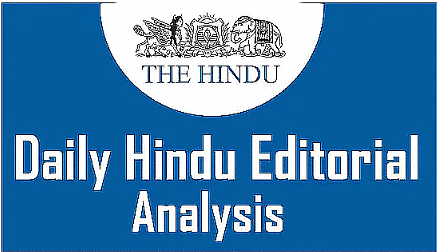UPSC Exam > UPSC Notes > Current Affairs & Hindu Analysis: Daily, Weekly & Monthly > The Hindu Editorial Analysis- 17th February 2024
The Hindu Editorial Analysis- 17th February 2024 | Current Affairs & Hindu Analysis: Daily, Weekly & Monthly - UPSC PDF Download

The Clear Message in the Court’s ‘no’ to Electoral Bonds
Why in News?
The Supreme Court struck down the electoral bonds scheme asserting that the scheme violates the right to information under Article 19(1)(a) of the Constitution.
Background of the Electoral Bonds:
- Announcement: In the 2017 budget speech and notified by the government in 2018.
- Provision: It is an interest-free bearer instrument that would be used to donate money anonymously to political parties.
- Questions Raised: This scheme was challenged shortly after it was notified in January 2018. In the past six years since the first petition was filed, six Chief Justices of India took office and twice- in 2019 and in 2021- the Supreme Court refused to stay the legislation.
About Electoral Bonds:
- Electoral Bond Nature: Electoral bonds are akin to promissory notes or bearer bonds, accessible for purchase by various entities, including individuals, companies, firms, or associations, provided they meet citizenship or incorporation criteria within India.
- Legislative Introduction: The Finance Act of 2017 brought about the introduction of electoral bonds, necessitating amendments to three significant statutes: the RBI Act, the Income Tax Act, and the Representation of People Act, thereby enabling their implementation.
- Denomination Range: Electoral bonds are available in denominations ranging from Rs 1,000 to Rs 1 crore, with multiples including Rs 10,000, Rs 1 lakh, and Rs 10 lakh. The State Bank of India holds exclusive authorization for the sale of these bonds.
- Donor Anonymity: A distinctive feature of electoral bonds is the anonymity of donors, whose identities are known solely to the bank, ensuring confidentiality throughout the donation process.
- Donation Procedure: Donors can purchase electoral bonds and subsequently donate them to political parties. These bonds can be redeemed by the respective political parties within 15 days through their verified accounts.
- No Purchase Limits: There are no restrictions imposed on the number of bonds that can be purchased by an individual or entity, facilitating potential large-scale contributions.
- Unused Bond Funds: In instances where political parties fail to redeem the bonds within the designated 15-day timeframe, the State Bank of India redirects these funds to the Prime Minister’s Relief Fund, ensuring efficient utilization of unused contributions.
Supreme Court’s Decision on Electoral Bonds:
- Unconstitutionality Ruling: In the case of Association for Democratic Reforms and Anr vs Union of India Cabinet Secretary and ors, the Supreme Court unanimously declared the electoral bonds scheme as "unconstitutional."
- Violation of Right to Information: The court held that electoral bonds violate the right to information, thereby impeding free speech and expression as guaranteed under Article 19(1)(a) of the Constitution.
- Quashing of Amendments: The court not only invalidated the electoral bonds scheme but also quashed the amendments made to the Income Tax Act and the Representation of People Act, which aimed to keep the donations anonymous.
- Directions to the State Bank of India (SBI):
- The SBI is directed to immediately cease the issuance of electoral bonds.
- SBI is mandated to furnish a report to the Election Commission of India (ECI) regarding political parties funded through electoral bonds starting from April 12, 2019.
- The ECI is instructed to publish the information received from SBI on its website by March 13.
- Political parties holding electoral bonds that are still within the 15-day validity period but remain uncashed are obligated to return these bonds either to the purchaser or to SBI.
Rationale Behind the Judgement:
- Access and Influence: Political contributions afford access to lawmakers, which in turn grants influence over policy-making processes.
- Quid Pro Quo Risks: There exists a genuine risk of quid pro quo arrangements stemming from financial contributions to political parties, given the inherent connection between money and politics.
- Violation of Right to Information and Article 19(1)(a): The anonymity provided by electoral bonds is seen as a violation of the right to information and Article 19(1)(a) of the Constitution, which safeguards freedom of speech and expression.
- Corporate Funding and Political Influence: Amendments permitting unlimited corporate funding are considered unconstitutional due to concerns regarding the disproportionate sway of businesses over the political landscape.
- Doctrine of Proportionality: The electoral bonds scheme fails the restrictive means test, suggesting that alternative approaches could achieve the intended goal of combating black money without encroaching upon informational rights.
Conclusion
There is a need to strike a balance between transparency and anonymity. Many jurisdictions achieve this by allowing anonymity for small donors while mandating disclosures for larger contributions.
- For instance, in the UK, political parties must report donations exceeding £7,500 in a calendar year from a single source. Similar limits in the US and Germany are $200 and €10,000, respectively.
- This approach aims to protect small donors from potential victimization and address concerns about quid pro quo arrangements with larger contributors.
The document The Hindu Editorial Analysis- 17th February 2024 | Current Affairs & Hindu Analysis: Daily, Weekly & Monthly - UPSC is a part of the UPSC Course Current Affairs & Hindu Analysis: Daily, Weekly & Monthly.
All you need of UPSC at this link: UPSC
|
38 videos|5349 docs|1132 tests
|
Related Searches





















